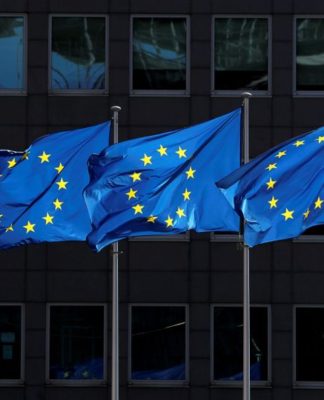‘Digital gold’ and European stocks: What to invest in (and what to avoid) in 2024?
Virtual hologram stock bar chart
By Doloresz Katanich
Published on 01/01/2024 – 06:45
Share this article
Comments
Euronews Business takes a closer look at what investments are most likely to yield in the new year, amidst various uncertainties in the global economy.
2023 was a roller coaster of a year for the markets, fuelled by rate-cut expectations from the US, the UK and Europe, global tensions erupting in the Middle East and, not least of all, disappointing news from China’s economy.
The best bets of 2023 seemed to be made around the tech sector**, led by giants such as Nvidia** and Alphabet benefiting from their AI prospects, while cryptocurrencies and stocks of weight-loss drugs have also had huge gains in 2023.
But what is the best bet for 2024?
European equities and crypto are expected to rise while commodities could be among the most disappointing investments in 2024, according to BCA Research’s outlook. It believes AI may also lose some of its steam.
A mixed global outlook may drive investors’ hands
A key driver of investment decisions this year is when leading central banks the US, the UK and the Eurozone are expected to cut rates.
Top European stock performers in 2023: Which companies soared over 100%?
2024 European stock market: Key sectors driving growth
“Growth stocks in particular are likely to keep benefiting from this renewed enthusiasm given that they have suffered in a higher interest rate environment,” Head of Money and Markets at Hargreaves Lansdown Susannah Streeter told Euronews Business.
“Hopes for a softer landing for the US economy could also help companies selling discretionary products in the US market. However, given that the full impact of interest rate hikes is yet to be felt, there is still a chance that it’ll be a bumpy way down from peak rates.”
Others forecast a lot murkier outlook for the global economy, the growth of which has been around 3% in the last two decades. However, output is expected to fall lower for the longer term, as the main contributor to the global economy, China, is battling a serious property crisis within its own economy.
Dhaval Joshi Chief Strategist at BCA Research told Euronews Business that no sector could replace entirely the missing output of the $100 trillion Chinese real estate market, which is worth a staggering six times the $18 trillion Chinese economy.
“The end of China’s housing boom means the end of the world’s main growth engine,” said Joshi. “So it’s at least 25% and that’s been the main engine of Chinese growth, but that’s also been the main engine of world growth.”
How are European companies exposed to China’s struggling property sector?
China’s slow recovery may hit European markets harder than expected
The chief strategist expects that demand for commodities will be hit hard by the slowing growth of China. “It’s going to be a much, much tougher environment for commodities, at least for the next year, because the big source of demand is just not there anymore and new demand is simply not enough to fill the gap from China.”
Global efforts of decarbonisation, which requires lots of metal, could partially make up for the loss.
Meanwhile, oil prices are expected to climb in the short term. “Hopes of a soft landing for the US economy has seen [oil prices] edge back up and if OPEC+ nations extend production cuts, it’s likely to gain more ground,” said HL’s Susannah Streeter.
Oil price forecast for 2024: What’s in store for global crude?
BCA agrees with the short-term spike, though it puts it down more to the geopolitical tensions in the Middle East. It sees no persistent threat of higher prices in the longer term. “The already weak demand will collapse if the price is too high,” explained Joshi.
What is 2024 holding for the US economy?
BCA Research expects a sharp slowdown in US growth. This is partly because real interest rates have only come into positive territory over the past six months. That rise is going to hit businesses which had previously benefited from negative real interest rates when inflation was higher than the Fed’s benchmark rates.
BCA expects that the central bank will have to cool down the economy, to cool down the prices.
US Federal Reserve holds rates steady and paves way for cuts in 2024
“If you really want to kill inflation and keep expectations anchored at 2%, then the low point is not 2, it has to be more like 1.5% or so. And it’s very difficult to get there without a recession,” said Joshi.
It may hit businesses hard, as well as consumption – the latter propping up two-thirds of the US economy. Household spending has painted a rosy picture so far but, Joshi said, a massive inflow of illegal immigrants in 2023 gave a false reading of the overall numbers.
“While real consumption increased by 2.4%, the population increased by about 1.2% or so. If you look at consumption per head, it’s not that good.”
If the US economy is showing signs of slowing, the stock market could also be facing a setback, with certain companies’ profits downgraded.
Bonds and European equities could be the winner of 2024
On the other hand, the economic downturn may favour bond investments across the US, UK and Eurozone. “It’s very positive for the bond market in 2024,” said the chief strategist.
In its 2024 report, BCA suggests that European equities could be the winner of the next 6-12 months.
Joshi puts his bets on healthcare companies’ performance, among other consumer staples stocks, which had underperformed in 2023. Switzerland’s MSCI index, which didn’t do well in 2023, is also expected to outperform in 2024.
Spanish stocks enjoy best year since 2009: Can they maintain momentum?
UK welcomes almost £30bn of investment ahead of Global Summit
Hargreaves Lansdown’s Susannah Streeter said: “Highly cash-generative businesses are a good basis for a diversified equity portfolio. Companies which have taken on a lot of borrowing to grow are always riskier than those who are flush with cash. With recession risks clouding the prospects for some European countries, this strategy is one to keep in mind.
Turning from gold to ‘digital gold’
Cryptocurrencies are going through a transformation.
For a long time, they were considered a high-risk investment but investors recently took them as a hedge against risks for events such as a banking crisis, a role that has long been identified with real gold.
Where in Europe are people investing in crypto the most?
Today’s markets: Bitcoin is 150% up, gold flirts with new record
“What we’re finding is that a lot of investors are very slowly diversifying from sort of physical gold to, what I call, digital gold,” said Joshi. “It’s also a generational thing. Anyone above the age of 50, doesn’t like digital gold, anyone in their 20s or 30s, says: ‘I am very, very comfortable with digital gold. I don’t want physical gold.'” Joshi explained.
How the AI mania may deflate
“The AI gold rush will struggle to find any gold,” writes the BCA report.
Tech stocks banking on the future success of AI had been soaring in 2023. However, the report notes that real productivity that contributes to economic growth is yet to be demonstrated. The one company that could really benefit from the AI mania is Nvidia “selling the picks and shovels” to those companies in a gold rush for AI, said Joshi. “But the tech companies that are buying the picks and shovels are struggling to find any gold.”
What are the most valuable global brands? Two are from Europe
How will AI change the world of work?
BCA’s overall recommendation is to keep more investments in long-duration bonds, Swiss equities and French luxury goods’ stocks but favour less cash (except for dollar, which is recommended) and energy or industrial metal-related investments.
Disclaimer: This information does not constitute financial advice, always do your own research on top to ensure it’s right for your specific circumstances. Also remember, we are a journalistic website and aim to provide the best guides, tips and advice from experts. If you rely on the information on this page, then you do so entirely at your own risk.






























